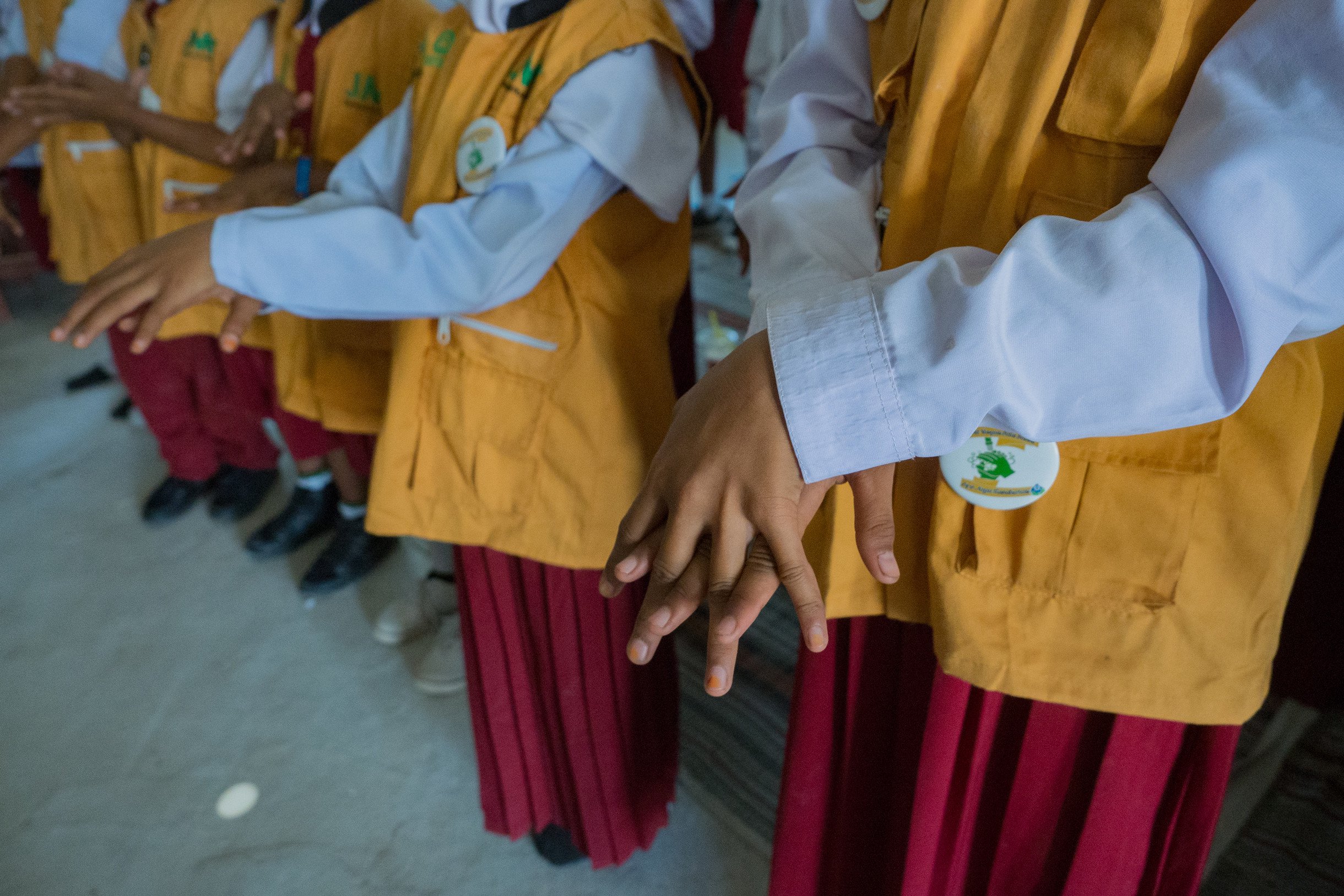In rural Sulawesi, Indonesia, women’s leadership usually takes place behind the scenes, but in the aftermath of an earthquake and a flood, three local women stepped onto center stage.
There is a village in Central Sulawesi, Indonesia, by the name of Rogo, which means “crushed” in the indigenous Kaili language. It is not hard to imagine how it got its name; earthquakes like the one that flattened homes here in September 2018 are surely woven into the history of the place.
But “crushed” in no way expresses the spirit of this town, thanks in part to a trio of women who, in the aftermath of the recent quake and the floods that followed, have helped the community recover by taking leadership—and lots of it. Anita (who, like many people here, goes by one name only), Dewi Sartika, and Ayu Novi Laksmi, are in charge of a committee whose work has included coordinating aid from a variety of providers, mobilizing the village to take part in projects like hauling pipes and distributing hygiene kits, and lobbying the district government for help in preventing floods.
Women have always assumed leadership of one kind or another, but in rural Sulawesi it’s unusual for them do it so openly and visibly. The shift in gender roles here is a source of gentle fun among the male leaders of the town, as we learned at a recent community gathering. “The women are stronger than we are, and more beautiful,” said Afion, a village leader, with a laugh.
The committee is focused on water, sanitation, and hygiene promotion (WASH), and the men seemed somewhat awed by the skills these women brought to the job. Their competence, time management skills, ability to work together peaceably, and capacity for diffusing conflicts that arise in the community has been eye-opening.
“If there are mistakes in the field, the women can fix them,” said Afion. “People trust them because they’re smart and can handle a lot of situations. If you choose men to lead a committee and they disagree, it can get very hard,” he added, “but the women are good at resolving conflicts. They are gentler than men.”
“And more disciplined,” said Tasmun Tahawali, another village leader.
Some of the women who work with the committee weighed in. “We are seeing that women can take on the roles of men with no loss of quality,” said Rara Miranda. “They are so inspiring.”
“I’m really proud of them,” added a woman named Askina.
As for the aid groups that came to town, some were surprised to see women in these roles, said Laksmi. But, she said, “they treated us with a lot of respect.”
The fact that the women do all this on top of their other responsibilities makes their contributions all the more remarkable. Anita, the head of the committee, is the wife of the village chief, which is a job in itself; Sartika is a mother of four and an intern at a local school; and Laksmi is simultaneously working a job, raising a child, and taking university courses. To say that they have mastered time management is an understatement, but they have also mastered the art of sharing the workload. “When I need to be spending time with my family,” said Laksmi, “I ask the others to do my job.”
Local partners on the front lines
Oxfam and the Humanitarian Knowledge Hub (known as JMK), a local consortium of partners, helped establish the WASH committee and encouraged women to step forward. “We are committed to gender justice around the world,” said Dino Argianto, Oxfam’s head of humanitarian programs in Indonesia. “Promoting women’s leadership is fundamental to that principle.”
Beyond that, the JMK-Oxfam role in the village has included constructing latrines and a new water system, providing hygiene information and materials, and supporting the work of women on the WASH team.
Everything Oxfam did in this emergency was a joint project with JMK, and soon JMK will take the work over entirely—the culmination of an effort to build the capacity for local organizations to lead on humanitarian response.
“Oxfam has knowledge and resources that can make a big difference in disaster response, but we want to see local and national organizations and governments taking the lead whenever possible,” said Argianto, “because when it comes to emergencies, they understand the local context and they will always be on the front lines.”

Words of advice
Of course, for the women there have been struggles along the way, including indirect challenges to their new roles. “You meet people who have a lot to say but don’t help out,” said Anita. “Who criticize our work but don’t offer alternatives.”
Asked what they recommend to anyone who wants to support women’s leadership, they were quiet for a while. Dispensing expert advice is not something they’re accustomed to doing. But the list they came up with was a strong one:
- Tell us we can do it–that we can raise our voices and be out front;
- Understand that women’s lives should not be confined to housework and cooking;
- Work for gender equality, and treat women and men as equals; and
- Stop violence against women.
Afion sees a future where women take on bigger leadership roles in the community. “Having women lead is an innovation,” he said, “and we like it.”
---
Oxfam’s programs in the aftermath of the Sulawesi earthquake, floods, and liquefaction that followed were carried out in close partnership with the Humanitarian Knowledge Hub, or JMK, a consortium of 23 Indonesian organizations. Operating as “JMK-Oxfam,” we reached more than 195,000 people with assistance; distributed hygiene kits widely, and homed in on hard-hit communities for more complex interventions, like installing and repairing water systems and distributing cash.
